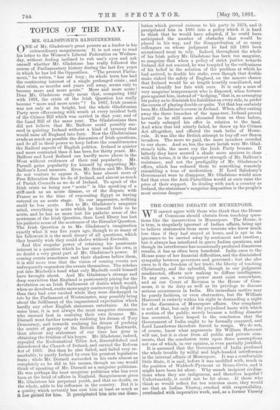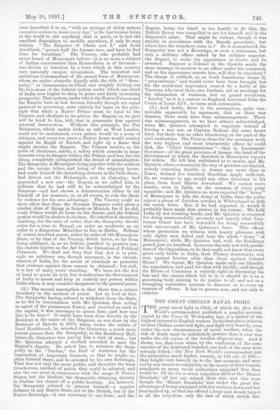THE COMING DEBATE ON MUNEEPORE.
WE cannot agree with those who think that the House of Commons should abstain from touching ques- tions like the insurrection in Muneepore. The House, it, is true, is singularly ignorant of Indian affairs, being apt to believe statements from mere tourists who know much less than if they had stayed at home, and is apt in its ignorance to be carried away by sentiment and emotion ; but it always has interfered in grave Indian questions, and though its interference has occasionally produced disastrous. results, it has as often been beneficial. India owes to the House some of her financial difficulties, and the diminished sympathy between governors and governed ; but she also owes to it the freedom of her trade, the liberty of teaching Christianity, and the splendid, though in our judgment misdirected, efforts now making to diffuse intelligence. In any case, a revising power must exist somewhere, and as our Court of Revision is the House of Com- mons, it is its duty as well as its privilege to discuss serious occurrences in India. His immediate motive may be purely factious, or even obstructive, but Sir William Harcourt is entirely within his right in demanding a night for the discussion of Muneepore affairs. Our complaint is not of that, but only of the prejudiced haste with which a section of the public, merely because a trifling disaster has occurred, have leaped to the conclusion that the Government of India ought to be formally censured, and Lord Lansdowne therefore forced to resign. We do not, of course, know what arguments Sir William Harcourt will use, but it is clear from all public and private com- ments, that the conclusion rests upon three assumptions not one of which, in our opinion, is even partially justified. It is assumed that the Government of India, produced the whole trouble by wilful and high-handed interference in the internal affairs of Muneepore. It was a comfortable little State, it is said, before it was meddled with, much in the position of Waldeck-Pyrmont or Reuss-Greiz, and it might have been let alone. Why smash incipient civilisa- tions when they are indigenous, and therefore hopeful Unfortunately, it could not be let alone. If those who think so would reflect for ten minutes more, they would see that an Indian Viceroy, crushed with responsibility, overloaded with imperative work, and, as a. former Viceroy once described it to us, "with an average of thirty serious executive orders to issue every day," is the last human being in the world to stir anything that is quiet, or to feel the smallest disposition to meddle anywhere, if only he may refrain. "The Emperor of China and I," said Lord Auckland, "govern half the human race, and have to find time for breakfast." The Viceroy, who probably had never heard of Muneepore before—it is no more a subject of Indian conversation than Reuss-Greiz is of German— was driven to interfere by a force which in this country very naturally escapes recognition. The truculent and ambitious Commandant of the armed force of Muneepore, whom we rather absurdly dignify with the title of "Sena- putty," or Commander-in-Chief, was roughly kicking out the key-stone of the federal system under which one-third of India now begins to sleep in peace and fairly increasing prosperity. That system, under which the Native Princes and the Empire have at last become friendly though not equal partners in governing, rests entirely for basis on the prin- ciple that while a Native Prince must be loyal to the Empire, and obedient to its advice, the Empire on its part will be loyal to him, will, that is, guarantee him against internal insurrection. Without this principle, the Pax Britannica, which makes India as safe as West London, could not be maintained, every palace would be a scene of intrigue, and every ten years a Native Army would mutiny against its Rajah or Nuwab, and light up a flame that might involve the Empire. The Princes receive, as the price of obedience, safety, a safety which extends in large measure even to dangers within the Palace, and has, for one thing, completely extinguished the dread of assassination. The Senaputty in Muneepore being popular with the soldiers and the savage tribes, and being of the reigning house, had made himself the disturbing element in the little State ; had driven out the Maharajah, now in Calcutta; had appointed a new one—the Regent, as we called him, to indicate that he had still to be acknowledged by the Empress—and had shown a determination either to rid himself of his nominee, or, at all events, to rule the State by violence for his own advantage. The Viceroy could no more allow that than the German Emperor could allow a similar state of things in Leipsic or Munich, for if he did, every Prince would sit loose on his throne, and the federal system would be shaken to its base. He interfered, therefore, insisting, for the sake of order, that the Senaputty should retire for a time to Bengal, an order as moderate as an order to a dangerous Municher to live in Berlin. Refusal of course involved arrest, either by order of th'e Muneepore State, or by that of the Viceroy, which latter, so far from being arbitrary, is, as we believe, justified by positive law, the statute known as the Add for the Detention of Political Prisoners. We shall not deny that that Act is in prin- ciple an arbitrary one, though necessary, in the circum- stances of India, for the arrest of criminals so powerful that evidence against them cannot be obtained ; but still, it is law of many years' standing. We have not the Act at hand to quote its text, but it authorises the Government of India to arrest and keep in custody any person within India whom it may consider dangerous to the general peace.
(2.) The second assumption is, that there was a certain treachery in the method of arrest. Let us look at that. The Senaputty having refused to withdraw from the State, as he did in conversation with Mr. Quinton, then acting as agent of the paramount Power, and received as such in the capital, it was necessary to arrest him ; and how was this to be done ? It could have been done directly by the Resident in the name of the Empress, as was done by the Resident of Baroda in 1876, when, under the orders of Lord Northbrook, he arrested the Guicowar, a much more potent person than the Senaputty, in the Residency Hall, where the Guicowar was paying him a visit of state ; but Mr. Quinton adopted a method intended to save the Regent's dignity. He asked him to summon the Sena- putty to the " Durbar," the Hall of Audience for the transaction of important business, so that he might ex- plain himself there, and be arrested by his own Sovereign. That was not only the most public, and therefore the least treacherous, method of action that could be adopted, and also the one most in consonance with the usage of Native States, but the kindest, the Senaputty obtaining thereby in Durbar his chance of a public hearing. As, however, the Senaputty refused to present himself—a regular defiance in any Native State, not to the British, but to the Native Sovereign—it was necessary to use force ; and the Regent, being too timid or too hostile to do this, the British Envoy was compelled to act for himself and in the Empress's name. That might be violent, though it was strictly in accordance with the Baroda precedent ; but where does the treachery come in ? Be it remembered, the Senaputty was not a Sovereign, or even a statesman, but only a military officer asked by his military superior, the Regent, to make his appearance at Court and be arrested. Suppose a Colonel in the Guards sends the same message to-morrow to an officer under his command, and on his appearance arrests him, will that be treachery ? The charge is rubbish, or, as Lord Lansdowne terms it, "preposterous," and would never have been brought but for the accidental impression created by a habit of the Viceroys, who treat their own Durbars, not as meetings for the transaction of business, but as grand receptions, " Levdes," as it is a custom in England, borrowed from the Court of Louis XIV., to term such ceremonies.
(3.) And lastly, there is the assumption, quite irre- movable apparently by argument, that as there was disaster, there must have been mismanagement. There was mismanagement, as we have always acknowledged, when Mr. Quinton attempted to negotiate instead of forcing a way out, as Captain Boileau did some hours later, but there was no other blundering on the part of the civil authorities. The Viceroy chose for the necessary work the very highest and most trustworthy officer he could find, the "Chief Commissioner "—that is, Lieutenant- Governor—of the great province of Assam, the head of the Government to which the Resident in Muneepore reports for orders. He left him unfettered as to means, and Mr. Quinton, whose resources in the way of garrison are limited, nobody expecting trouble in Assam any more than in Essex, deemed five hundred Goorkhas amply sufficient. So, we venture to say, would any other Governor in his place, from Lord Harris downward. We cannot move armies, even in India, on the occasion of every petty squabble ; and Mr. Quinton no more expected the" Army " of Muneepore to defy the Army of India, than the police expect a group of drunken rowdies in Whitechapel to defy the entire force. Nor, if he had expected it, would it probably have made him swerve in his course. We hold India by not counting heads, and Mr. Quinton is censured for doing unsuccessfully, precisely and exactly what Lieu- tenant Grant has been rewarded. for doing successfully with one-seventh of Mr. Quinton's force. This officer, whose promotion we witness with hearty pleasure, with only eighty men defied and beat the whole " Army " of Muneepore ; while Mr. Quinton had, with the Residency guard, just six hundred. Is success the only test with gentle- men of the Opposition, or do they really not know that every great early battle in India, from Plassey downwards, was won against heavier odds than those against Colonel Skene ? We repeat, Mr. Quinton made only one blunder, the negotiation, and paid for that with his life ; and though the House of Commons is entirely right in discussing his fate and the causes which led. to it, it should do it as a governing body seeking to do justice to all, and not as a wrangling committee anxious to discover or to cover up reasons of offence. It has to govern now, and not only to criticise.







































 Previous page
Previous page